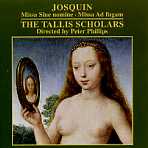For more than 25 years Peter Phillips and his Tallis Scholars have shown how scrupulous dedication to a specialty (Renaissance vocal music), uncompromising performance standards, and control of the creative process–from research to performing editions to the recordings themselves (via the Gimell label)–can result in consistently first-rate productions that continue to stand as unsurpassed (in some cases unrivaled) contributions to the larger and very distinguished Renaissance music catalog.
Of course much of this success–given that we’re talking about a cappella singing here–is due to the particular singers, not only in terms of technique but also regarding the quality of the voices and their effect in the context of the ensemble. The Tallis Scholars always has had a unique sound, a vibrant, multi-faceted resonance in which we hear not only the sum but the individual contributing parts as well. While we notice individual vocal timbres (no “super-blend” here!), the key is that they are not incompatible, such that we clearly hear interior lines while appreciating the unusually powerful effect when these variously-colored voices combine at chordal climaxes and cadence points.
All of which leads to the point that the vocal lineups here are among the best, most agreeably chosen of all of the Tallis Scholars recordings, especially concerning the upper parts–soprano (superius), alto, and tenor. There are a few Tallis Scholars recordings where the soprano voices become a little penetrating and prominently bright; but there’s absolutely no trace of that here. The balances are superb–and the crucial bass support, provided by veterans Francis Steele and Donald Greig, is as solid and richly resonant as ever.
The two masses featured here are not only new to the CD catalog (another common aspect of Tallis Scholars programming), but they also represent “the only two Masses by Josquin that are entirely based on canons.” Although this element of Josquin’s compositional structure isn’t necessarily easy to follow on a recording, the above-mentioned distinctiveness of vocal parts certainly makes it easier to recognize, especially in the more straightforward layout of the Missa Ad fugam, where the canonic theme is repeated in each movement.
Tallis Scholars fans will need no encouragement–or even a review–to convince them of the worthiness of this new recording, the third in a projected cycle of complete Josquin masses; but anyone who doesn’t yet know this group would do well to start here. Josquin’s music certainly rewards repeated listening, but it particularly shines when performed by such experienced, authoritative singers who’ve made a career not only performing this repertoire, but taking the time and committing the effort to get it right. [3/4/2008]
































